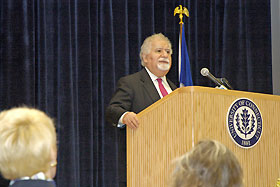For more archives, go to the Advance Archive/Search Page.
Gregorian Kicks-Off Teacher Ed Reform Initiative
Students do not fail; teachers fail, said Vartan Gregorian, president of the Carnegie Corp. of New York, during his keynote speech at the Teachers for a New Era inaugural event October 1.
 |
Vartan Gregorian, president of the Carnegie Corp. of New York.
|
| TNE Website |
More than 200 people gathered in the Student Union Theatre to hear the distinguished scholar's perspective on American schools and the UConn's role in Carnegie's teacher education reform initiative.
"I'm here today for two reasons; to pay tribute to you and to expect service from you," said Gregorian, who recently received recognition for his service to the nation.
Gregorian, who is credited with revitalizing the New York Public Library, served as provost of the University of Pennsylvania, president of Brown University, and has taught at four other institutions of higher education. Recently, he was awarded the nation's highest civil award, the Presidential Medal of Freedom.
After Gregorian cited a list of UConn's successes, he said, "We acknowledge your accomplishments, your stature. But recognition brings challenge on behalf of our nation's schools and the nation's future. The time is right for intervention."
The Carnegie Corp. has stepped forward with a school intervention plan, with support from the Annenberg and Ford Foundations. The group is investing $65 million in the Teachers for a New Era project, an initiative that aims to improve the quality of classroom teachers by supporting the development of excellent teacher education programs.
The UConn-TNE project, which is receiving $5 million in funding over five years from Carnegie, involves a partnership between the Neag School of Education and the College of Liberal Arts & Sciences. The two faculties are increasing their research collaboration; analyzing and redesigning curriculum in general education and content courses; and developing new tools for assessing the impact of teacher quality on student performance.
While improving teacher education is at the heart of the UConn project, it has been designed to have an impact on every UConn student as well, through courses, research activities, and student experiences in both liberal arts and sciences and education.
By participating in Teachers for a New Era, said Gregorian, UConn rightly supports the concept that preparing teachers is a university-wide responsibility, not solely that of the school of education.
University President Philip E. Austin said, "Teachers for a New Era is a vital and valuable program, and we're honored to be included."
In addition to UConn, members of the TNE network are: Stanford University, Michigan State University, the University of Virginia, Boston College, Florida A&M University, the University of Texas at El Paso, the University of Washington, the University of Wisconsin-Milwaukee, Bank Street College of Education in New York City and California State University, Northridge. They will share data, instruments, and ideas.
Ross MacKinnon, dean of the College of Liberal Arts and Sciences, said "Teachers for a New Era is a catalyst for achieving our ultimate goal of increasing student achievement. By strengthening our partnership with the Neag School, Teachers for a New Era helps us do a better job, not only of preparing excellent teachers, but also of educating our undergraduates across the entire University."
The TNE member institutions are expected to be exceptional programs that become models for the rest of the country. Richard Schwab, dean of the Neag School of Education, said research has shown that high quality teachers have a direct impact on student learning and achievement.
"While our five-year teacher education program has been nationally recognized for its high standards, we know we can do even better, and the Teachers for a New Era initiative enables us to build upon our strengths," he said.
The TNE project at UConn is headed by Scott Brown, a professor of educational psychology, and it is his responsibility to ensure the initiative at UConn adheres to the core principles of Teachers for a New Era. These are evidence-based decision making, engaging liberal arts and sciences faculty in teacher preparation, and support for a residency program for new teachers entering the profession.
"By adhering to these principles," Brown said, "we'll be able to give students the best education possible and have a direct impact on the achievement of the pupils in our nation's classrooms."

